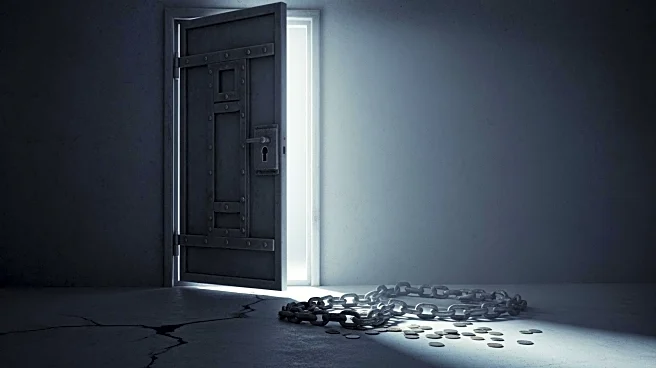What's Happening?
Iran's clerical rulers are intensifying a crackdown on political dissent while relaxing visible social restrictions. This strategy aims to manage public opinion amid growing economic isolation following
the snapback of UN sanctions due to stalled nuclear talks with Washington. The crackdown includes harassment, detention, and punitive measures against journalists, lawyers, students, and human rights advocates. Despite easing social freedoms, such as allowing women to walk unveiled, the government maintains firm red lines against genuine dissent. The strategy is seen as a tactical management approach to survive volatile times, as Iran faces internal and external pressures, including potential Israeli strikes if diplomacy fails.
Why It's Important?
The intensified crackdown on dissent in Iran highlights the country's struggle to balance internal stability with external pressures. The economic isolation resulting from renewed sanctions could further strain Iran's economy, affecting trade and increasing public frustration. The government's approach to managing dissent while easing social restrictions may temporarily pacify the public but risks long-term instability. The situation also raises concerns about human rights violations and the potential for increased regional tensions, particularly with Israel and the United States, which could impact global diplomatic relations and security dynamics.
What's Next?
Iran's strategy of easing social restrictions while cracking down on dissent may face challenges as public frustration grows. The potential for renewed mass protests remains, especially if economic conditions worsen. International pressure on Iran to address human rights concerns and engage in diplomatic negotiations may increase. The possibility of Israeli military action if nuclear talks collapse could further escalate tensions. Iran's leadership may continue experimenting with concessions to maintain control, but the risk of internal unrest and external conflict persists.
Beyond the Headlines
The crackdown on dissent in Iran raises ethical concerns about human rights and freedom of expression. The government's selective enforcement of social freedoms, such as the hijab law, reflects a complex strategy to manage public perception while maintaining control. The situation underscores the challenges of balancing cultural norms with political stability in a region marked by historical tensions. The long-term implications of Iran's approach could influence regional dynamics and international relations, particularly regarding nuclear negotiations and security alliances.










